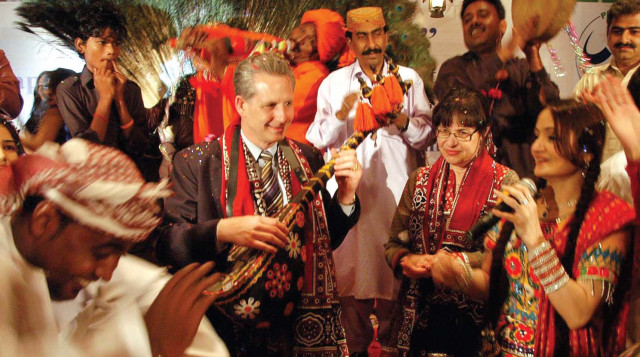US consulate’s exchange programme collects alumni
Pakistanis share stories of visits and return to work in education, culture human rights.

US consulate’s exchange programme collects alumni
At the US Consulate in Karachi’s Alumni Connect seminar on Tuesday, it didn’t take much time for the sober suits to shed their ceremony and break out into a dance to the beat of a 5,000-year-old Sindhi folk song. The celebration was long overdue, as 200 people came together after succesfully completing several exchange programmes sponsored by the consulate over the past few years.
“I learnt that what their media promotes about Pakistanis is not true and what our media promotes about Americans is also not true,” remarked Summan Sohail, who attended The Kennedy-Lugar Youth Exchange & Study (YES) Programme. “Both are very warm and tolerant people.”
It is perhaps such a nuanced view of Pakistan and the US that is the overarching aim of such programmes. In YES, for example, students like Summan can stay up to a year with a host family. Summan told The Express Tribune that while she comes from a protective family, the programme was such that even they grew more open to such ideas after she returned home safely. She nearly cried when she had to leave her host mother and siblings.
The alumni also come from the International Visitor Leadership Programme, the Fulbright and Humphrey fellows, from the summer programme and smaller tours such as the social media one recently held. As relations between the two countries are not as smooth as people would want, these exchange programmes enrich people’s experiences, said Public Affairs Officer James Warren, who welcomed the guests.
While the programmes have been running for a while now, the Pakistan-US Alumni Network was founded in 2008. It is made up of enthusiastic Pakistanis dedicated to the development of their country, working in education, culture and the arts, human rights, entrepreneurship, capacity building and the rule of law. According to Cultural Affairs’ Specialist Sarah Alam, the mission of the alumni network is to promote democracy, freedom, humanity and to provide assistance to Pakistan.
Aside from the hard work, there is plenty of fun as well, as Fareeha Qaim pointed out. This journalist visited the US for a week in March 2010 and had a chance to see the headquarters of Google, Twitter and Facebook. She learnt about the impact of social media on people’s behaviour and perceptions and policies. All of this is knowledge that she can now use professionally while writing. Similarly, Samana Ali, a student of Karachi Grammar School who visited the US for the first time to attend summer school, said that she learnt to appreciate diversity.
Bilal Zubair, an Intermediate student who visited the US for one academic year under the YES programme, said that while he was bullied by two Americans in the beginning, he found that there were a hundred who actually cared to know about the country and were very welcoming. He comes from a middle class background and was studying in a government college prior to YES. He not only learnt English but also gained confidence to express himself - so much so that he even dabbled in DJ-ing.
Barrister Shahida Jamil, one of the members of the network, told The Express Tribune that although it’s just the beginning, it is a wonderful opportunity to address the trust deficit that Pakistan faces as a nation internationally. It’s in Pakistan’s ‘national interest’, she said. “Our country is in great need for investment in trade for our economy so that our people get jobs and this will not happen until the trust deficit is purged,” she added.
Published in The Express Tribune, June 22nd, 2011.



















COMMENTS
Comments are moderated and generally will be posted if they are on-topic and not abusive.
For more information, please see our Comments FAQ